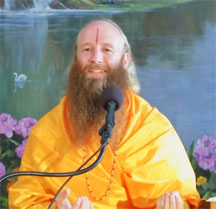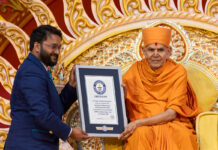 In the first chapter, Arjun explained his dilemma to ShreeKrishna, and told Him he did
In the first chapter, Arjun explained his dilemma to ShreeKrishna, and told Him he did
not want to fight the war. But he also admitted that his mind was clouded with emotion, and he was unable to clearly judge what his dharm was. Thus, he asked Shree Krishna to advise him on what was best for him to do in this situation. In the second chapter, Shree Krishna explained from three different perspectives why Arjun should arise and indeed fight the war.
Convincing Arjun to fight the Mahabharat war
Shreve Krishna provided three main explanations or reasons to Arjun to fight the war. He started with the “sankhya” explanation, telling Arjun that his true self is the soul, which is eternal and indestructible. Death is only the end of the physical body – the soul goes on to another birth. Thus, he should not fear that anyone is going to be killed in the imminent battle. He should do what is right regardless of the possibility of physical death.
He followed up with the “karm” explanation, telling Arjun that it was his duty or dharm to fight the war. He explained the consequences for both, performing one’s duties or not performing one’s duties. He advised Arjun that fighting the battle would be considered good karm, for which he would be rewarded in the future, and not fighting the battle would be considered bad karm, for which he would be punished.
Both good karm and bad karm are binding for the soul. Thus, Shree Krishna concluded with the “karm yog” explanation, telling Arjun that if he wants to be free from the bondage of all karmas, then he should perform his dharm while keeping his mind in God, and be unattached to the fruit of his actions. He should maintain equanimity of mind in both success and failure. Thus attaching his mind to God, he will attain ultimate peace and permanent Divine bliss.
After hearing this explanation from Shree Krishna, Arjun was still confused about fighting the war. At the beginning of the third chapter, he questions why it is necessary to fight the war if the ultimate goal is to attain Divine bliss and go beyond this world. In other words, Arjun is under the misconception that if one takes refuge in the knowledge of the Divinity of God and the soul, then one does not have to engage in physical action on this mundane plane.
If the goal is God-realization, what is the need for performing any actions in the world?
Shree Krishna explains to him that it is not possible to refrain from physical action, even though the ultimate goal is to transcend material existence and attain God. As long as we are in this world, we inhabit a body and must engage in some kind of karm, at least to maintain that material body (chapter 3, verse 8).
Even a God realized Saint must engage in physical action to support his physical body – for as long as he stays in his body he must also eat and sleep like the rest of us. Thus, we cannot negate the necessity of this physical world, nor our involvement in it.
Just as it is not feasible to maintain a state of physical inactivity, it is impossible to maintain a state of mental inactivity. The human mind cannot remain still, even for a fraction of a second (chapter 3, verse 5). It is always driven to activity by our inner desire for happiness, so it always dwells on the objects of desire, thus keeping us in a constant state of inner activity. Even after a long day, we may be sitting on the couch and quietly relaxing, but internally our mind is still running at the same speed.
These inner thoughts also count as karm. If someone thinks that by solely giving up their involvement in the outer world that they have become action-less (and free from the bondage of karm), they are mistaken. Because internal worldly attachments still exist, and is the main cause of bondage (chapter 3, verse 6). Even if someone leaves all their possessions and goes to the jungle, he/she may still find themselves longing for the posh car and beautiful house they used to own. In that case, his inner activity hasn’t ceased, and he is in the same state as when he was fully involved in the world.
In this way, Shree Krishna explained to Arjun that one does not attain the state of being action-less just by ceasing physical activity. Nor does one attain the state of perfection just by abandoning one’s involvement in the world (chapter 3, verse 4). We are bound to perform some physical actions, at least to maintain our body; and even if we renounce our involvement in the world, we cannot stop the activity of our mind – thus we are not free from the bondage of karm.
How to liberate oneself from the binding effect of actions?
There are two ways of freeing oneself from the binding effects of our karm (chapter 3, verse 3). One is called gyan yog, in which the person renounces the sense of doership by understanding that he is the soul, and not the body, senses or even the mind. It is the body, senses and mind which are the doers, not the soul. Thus, if you keep your mind established in this state of self-realization, the actions you perform will have no binding effect.
The other way is called karm yog, in which a person keeps his mind established in a state of equanimity, unattached to the fruits of his actions, and unaffected by the success or failure of his efforts. Due to the absence of attachment, his actions will also have no binding effect. In either case, the person doesn’t need to abandon the performance of his duties.
Yet, this does not fully explain why Arjun should fight the war. Could he not practice gyan yog or karm yog in solitude somewhere far away from the battlefield? In the next article, we will discuss Shree Krishna’s explanation to this question.
Disciple of Shree Kripaluji Maharaj:
Swami Nikhilanand Ji is a Canadian born Hindu spiritual leader based in Austin, Texas. He is a sanyasi disciple and pracharak of Jagadguru Shree Kripaluji Maharaj.
Attracted to the teachings of Hinduism from a young age, Swamiji eventually let his deep spiritual longing lead him to India, where he was most fortunate to come under the guidance of Shree Kripaluji Maharaj. Thereafter, living in the ashrams of JKP, he extensively studied Hindi, the philosophy of the prime Sanskrit scriptures (Vedas, Darshan Shastras, Gita, Bhagwatam), and practiced meditation in the tradition of raganuga bhakti. In 2003, he was given sanyas.
Now, with the blessings of his Guruji, he offers satsang programs throughout America, engaging audiences with his clear explanations of Hindu philosophy coupled with inspired chanting of Sanskrit mantras and shlokas and charming nam sankirtan. His informative and compelling speeches provide practical insight into how to adopt the teachings of Sanatan Dharm into our daily lives, and inspire us to awaken our inner spiritual potential.
To stay in touch with Swami Nikhilanand Ji, like his Facebook page at https://www.facebook.com/SwamiNikhilanand or follow him on twitter at https://twitter.com/Swami_Nikhil.
Swami Nikhilanand






